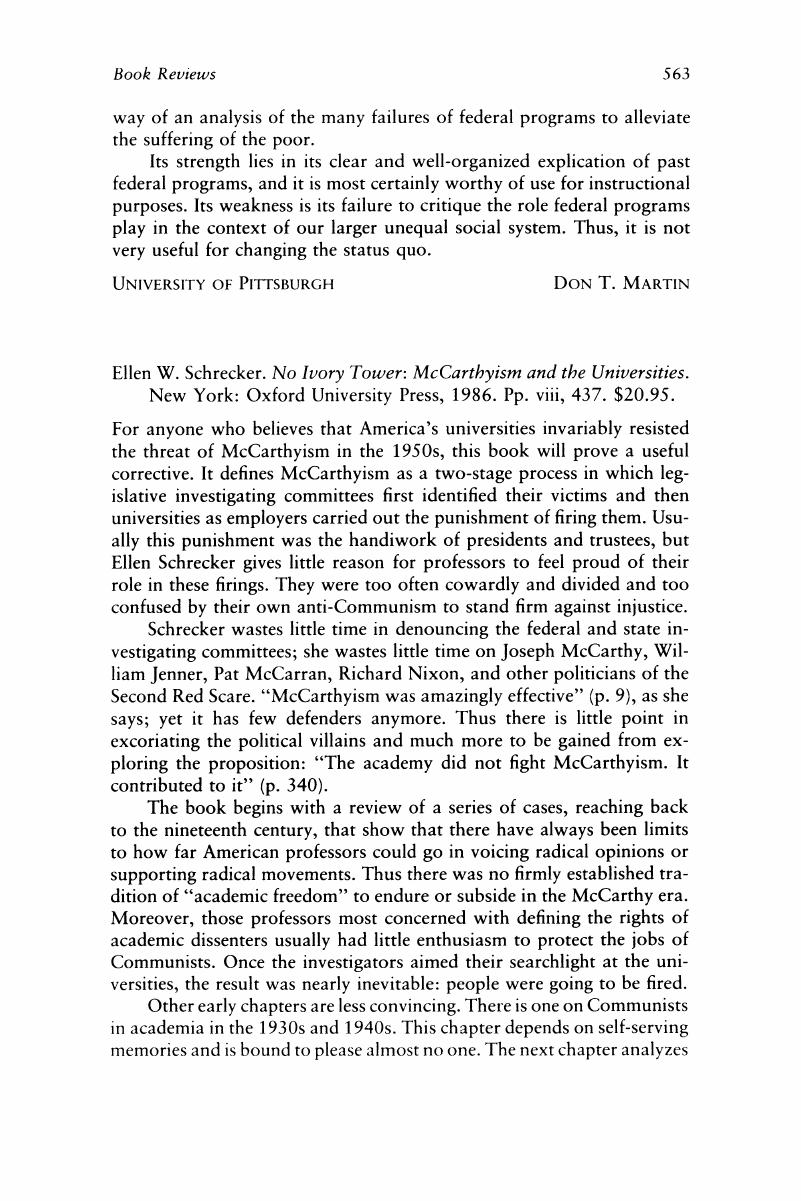No CrossRef data available.
Published online by Cambridge University Press: 24 February 2017

1 “Like their master in Moscow, the Communist intellectuals in America detested above all, not capitalism nor even fascism, to both of which the switching Party line taught them to accommodate themselves—their one hatred which knew no amelioration was toward the independent radical.” Rosenberg, Harold The Tradition of the New (New York, 1960), 238. This observation no longer seems as familiar as it once did.Google Scholar
2 For a few examples of the range of expression, see Hook, Sidney Heresy Yes—Conspiracy No (New York, 1953); Hook, Sidney Out of Step: An Unquiet Life in the Twentieth Century (New York, 1987); Fiedler, Leslie An End to Innocence: Essays on Culture and Politics (Boston, 1955); Trilling, Lionel The Middle of the Journey (1947; Garden City, 1957); Bentley, Eric “Afterword,” Thirty Years of Treason: Excerpts from Hearings before the House Committee on Un-American Activities, 1938–1968 (London, 1972); Howe, Irving A Margin of Hope: An Intellectual Autobiography (New York, 1982).Google Scholar
3 Some of Schrecker's informants resemble the professors interviewed in a recent study of academic lawsuits. Plaintiffs who sued their institutions are quoted as saying that “they paid the greatest costs in their professional and social lives, finding once-friendly colleagues turning cold. Faculty members felt betrayed when colleagues eventually made their peace with administrators who were defendants.” One of them wrote: “I discovered if there is a war the College Professor is the last person on earth I'll share a foxhole with.” McMillen, Liz “The Residue from Academics’ Lawsuits: Often Anguish for Everyone Involved,“ Chronicle of Higher Education, 1 Apr. 1987, 14.Google Scholar
4 Examples include mathematician Davis (Canada), classicist Finley, Moses I. (England), and biochemist Joseph Cort (Czechoslovakia). On the other hand, some of the figures who crop up in these pages—sociologist Robert Bellah, law professor Vern Countryman, psychologist Leon Kamin—went on to successful careers in American universities, but not without periods of exile and hardship. Others, like physicist Philip Morrison and biologist Marcus Singer at Cornell, never lost their jobs but endured long periods of jeopardy.Google Scholar
5 One man, who had left anthropology because he could not get a passport, and who had bounced through a succession of unsatisfactory jobs, got angry when his daughter wrote a letter joking about gratitude to Kruschchev when the Cuban missile crisis was averted. He was convinced his mail was still opened and danger was always imminent. Irving Howe writes of the “premature capitulation” of his Brandeis colleagues, “a pulling in, an anticipatory caution.” He adds: “that of course was one of the most damaging consequences of McCarthyism: it spread a pall of fear and anxiety beyond its immediate victims.” Margin of Hope, 223–24.Google Scholar
6 See Edmund, S. Morgan's recollection of Brown's president Henry Wriston, who “regarded it as his function to protect people in the university from any outside interference like McCarthyism.” Courtwright, David T. “Fifty Years of American History: An Interview with Edmund S. Morgan,“ William and Mary Quarterly 44 (Apr. 1987): 347.Google Scholar
7 Higham, John “Beyond Consensus: The Historian as Moral Critic,“ in Writing American History: Essays on Modern Scholarship (Bloomington, Ind., 1970 [essay 1st pub., 1962]), 138–56.Google Scholar